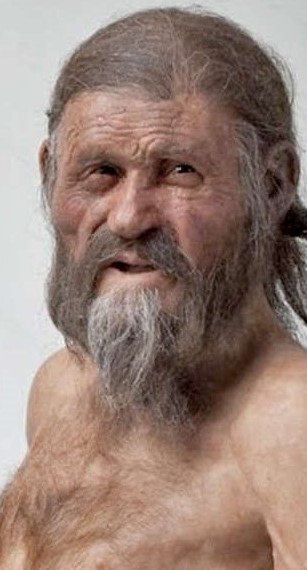He died before the wheel was invented, before writing was invented and before the first pyramids were built. Yet, we know what he ate for his last meal and what he wore on the day he died.
He is known as Ötzi (rhymes with Yahtzee) the Iceman, a 5,300 year old mummy found in a melting glacier in 1991 high in the Tyrolean Alps.
In the past 26 years, Ötzi has been probed, scanned, dissected, and tested. Scientists have even constructed a replica of his body, seen above.
He looks strangely familiar—like a shirtless football fan ready to have his chest painted. Go Neolithic Warriors!
He looks familiar because Ötzi is family, a great-grandfather 265 generations removed, which is not speculation: according to one source 19 of his genetic relatives have been found living in the Tyrolean area.
Looking at his reconstructed face and body, we search for commonalities, entry points to understanding. We look for ourselves in Ötzi.
- We wear shoes and socks. He wore socks, soft green grass stuffed inside shoes made from a netting of lime tree inner bark covered with fur and animal skin. (The shoes are so cozy that a Czech shoe company tried to secure the rights to sell Ötzi foot wear.)
- We wear underwear. His was made of tender calfskin sewn into loincloth. He wore a bearskin hat.
- Ötzi had 61 tattoos: straight lines etched in the skin and filled with black soot from a wood fire. It is believed to have been applied medicinally, perhaps an early form of acupuncture. He carried a first aid kit with birch fungus which was still being used as an antibiotic and styptic into the 20th
- His blood cells resemble modern red blood cells. He had cavities, parasites in his colon and evidence of Lyme disease in his DNA. He was at risk for cardiovascular disease.
But, none of these caused his death.
A forensic scientist has pieced together a plausible story to explain Ötzi’s death. Judging from an unhealed gash in Ötzi’s hand, the scientist contends that Ötzi had been the victor in a fight down in the valley a day or two before he died. His killer may have followed him up the mountain to seek revenge, waiting to catch Ötzi defenseless. Half an hour after Ötzi’s meal of Ibex and spelt, the killer fired an arrow from 100 feet away into Ötzi’s back piercing the subclavian artery. Ötzi bled to death in minutes. The killer left Ötzi untouched, stealing nothing, not even the valuable copper ax Ötzi carried.
Ötzi survived the weaknesses of the human body, but he was killed by the failings of human emotion. He was the victim of revenge, jealousy, power, or greed—either the killer’s or his own or both.
The Iceman appears to have been murdered 5,300 years ago, perhaps in retaliation for his own act of violence.
Ötzi’s body now rests in a chilled glass box in the South Tyrol Museum of Archeology in Bolzano, Italy. He is regularly sprayed with sterile water to keep the Iceman on ice. He is the hot draw for Ötzi tourism. Thousands of people come to see him every year.
“He is so close to us. He uses the same equipment as we do when he goes to the mountain, just the materials are different,” the museum’s director of public relations told the New York Times in 2017.
Ötzi is close to us. We recognize his body, his ailments, and his accoutrements. And, we recognize the violence and emotions that led to his death: Revenge, jealousy, power and greed.
The museum director went on to say, “And we are still killing each other, so maybe there hasn’t been so much evolution after all.”
Does this mean that in 5,300 years we have not evolved as a species? However, that question—
“Have we evolved beyond killing each other”—misunderstands evolution.
The popular myth is that each step in evolution is an improvement—mutations towards a more efficient being. It is an assumption that we are evolving away from the primitive towards the utopian.
However, evolution is not remedial class work nor advanced placement studies. We evolve to survive, which does not require us to reach heights of excellence—physical, mental or moral. We need to be just good enough to live long enough to procreate.
Living long enough to procreate seems hollow especially in the grand scope of human achievement. Survival seems like a low hurdle now that our species dominates the planet.
Our species—Homo Sapiens—has been on earth for somewhere between 100,000 to 200,000 years. Our hominid ancestors diverged from the ape lineage between 5 and 8 million years ago.
By contrast, dinosaurs lived on our planet for 175 million years.
In a time frame of millions of years, we are contemporaries of Ötzi.
Yet, in spite of our imagination, even our ability to predict the destruction of the earth by our own actions, we are still shooting each other in the back.
Ötzi lived to be roughly 45 when an act of violence ceased any further inheritance of his DNA. The killer continued on. Are revenge, jealousy, power, and greed a part of human evolution?





